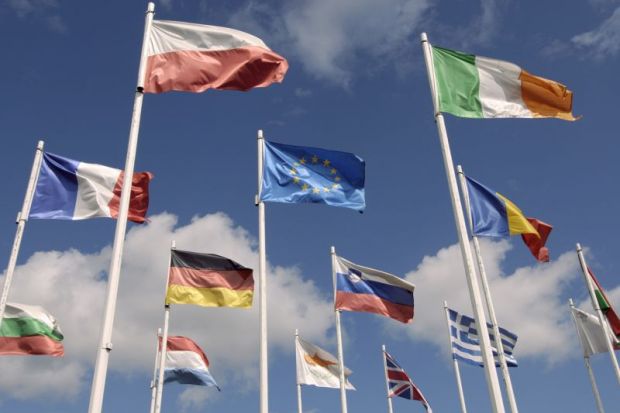The European Union’s next research programme is likely to have a greater emphasis on funding for applied research, experts have warned, as universities were told to put pressure on politicians to increase the budget.
Christian Ehler, a German politician who has been a member of the European Parliament since 2004, said that there was an expectation that Horizon Europe will “contribute specifically to CO2 reduction, fighting Covid and to the digital revolution” and this will “lead to a reshuffling of money from basic research to applied research and even more to industry research and market uptakes”.
Speaking at the European University Association’s (EUA) Funding Forum, Dr Ehler highlighted the EU’s target to reduce greenhouse gas emissions from 1990 levels by 40 per cent by 2030.
“Why does that play a role? Because if you want to do something like that in 10 years we are enforcing a tendency, as we have been doing to some extent also with Covid, that we are reaching out for higher TRLs [Technology Readiness Levels],” he said. TRLs are indicators of the maturity level of particular technologies and used in the research programme.
He added that the drive for higher TRLs “had been weakening the first pillar in the programme”, which covers open science and includes European Research Council funding, “quite dramatically”.
“It will recalibrate innovation in more general terms to close-to-market solutions, because otherwise it doesn’t get into the market within a decade. That will put the whole idea of a research programme under even more pressure,” he said.
However, he said the counter argument was that if the EU does not “back up the funnel of innovation” through basic research funding now then there will be no innovation from 2035 and beyond.
In July, EU leaders agreed to spend €80.9 billion (£72.9 billion) on Horizon Europe, €13.5 billion less than was hoped for in May. The seven-year programme will get just €5 billion of the EU’s €750 billion recovery package, which has been tacked on top of the bloc’s normal budget in the wake of the pandemic.
However, Dr Ehler predicted that the budget for Horizon Europe, which starts in January, may increase slightly.
Michael Murphy, president of the EUA, said that the university sector “clearly haven’t been as impactful as we need to be” and pushed every university in Europe to “call their MEP, connect with the prime minister’s office and the finance ministry and put the pressure on” to increase the research budget.
“We’re very conscious of the risk of the shift in the existing budget away from basic research,” he added. “The consequences of this will be seen not next year or the year after by society – although it will in our community of underfunded researchers – but in 2035 and onwards when the pipeline has dried up.”
He added that universities were “ultimately responsible for the pipeline to business and we really must keep hammering that message home”.
The higher education sector could also be “a little more respectful” in conversations with politicians, he added, claiming that historically “we’ve been slightly arrogant in how we have portrayed ourselves”.
Peter Duisenberg, president of the Association of Universities in the Netherlands, who also spoke at the event on 22 September, said that the EU needed to invest more in research and innovation “if we truly want to be competitive”.
“In racing terms we are losing; we are not in the frontrunners group,” he said, adding that the US and China were “moving much faster” in health, climate and artificial intelligence research.
“I think our governments have done a tremendous job in sticking together in addressing the crisis and coming up with recovery funds. But by focusing so much on the solution they lost a bit of sight on the longer-term competitiveness of Europe.”




